|
Versión en español

Trevor Jones has been in the film industry since the early 80’s. He has worked on a large amount of diverse films, and has in his account big scores like The Dark Crystal or The Last of the Mohicans. As the release of his last work, the funny score to Around the World in 80 Days, approached we contacted his agent in hoping we could get an interview. The result was a huge interview that lasted almost 3 hours (and took place in two days) in which we discovered the unique personality of this talented composer. We have decided to split this interview in two parts, given its length. In this first part we will cover the 80’s, leaving for the second one, the rest of his works, up until today.
Seville, June 30th. 13:00 Local Time
A distant bell rings…
Trevor Jones (TJ): Hi, this is Trevor, who’s calling?
BSOSpirit (BS): Hi Trevor, this is Sergio.
TJ: Oh, hi Sergio, how are you?
BS: I’m fine thanks, and you?
TJ: Very Good, looking forward to do this interview.
BS: Let’s begin then.
TJ: Okay.
BS: Well, we’re going to begin with your earliest works in the 80’s. Is that okay?
TJ: Yeah, fine…let’s see what I can remember (laughs).
BS: (laughs) When you think of your
earliest works, I think it’s unavoidable to think about Excalibur.
Previously to Excalibur you wrote music for a few minor films.
How was your reaction from working in these films to work on such a
big production as Excalibur?
TJ: Well…previously to Excalibur I’d
done about 20 students films, and because I’d done those films
was the reason why John Boorman contacted me. He saw one of
those films, called “The Beneficiary”, and was thrilled
by my work, so he decided to call me and give me this fantastic opportunity.
And of course, I was very excited to be offered such a prestigious
project…a chance of a lifetime you could say…this was
a big break…and being John Boorman such a visionary director
that had done “Hell in the Pacific” and…what
was the other…the one with John Voight and the other
three that takes place in a river…
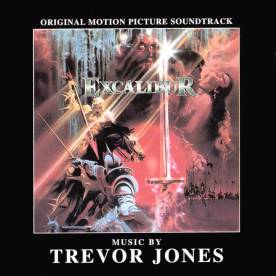
BS: Deliverance!
TJ: That’s right (laughs). So he had done those two great films, and I was a great fan of his work as a filmmaker…his films had a high caliber…not to be fun about it…Excalibur High-Caliber (laughs)…he was a prestigious director then I was thrilled to work with someone I admired so much.
BS: And focusing in the music, whose was the idea of including classical pieces such as Wagner’s Tristan and Isolde, Siegfried and Orff’s Carmina Burana?
TJ: Well, previous to starting filming Excalibur, John had gone to Germany to see the Bayreuth Festival; there he saw the Ring Cycle, and immediately fell in love with Wagner’s masterpiece…so when he asked me to work on Excalibur he told me that I would had to work on the instrumental side of the score, the source music if you like…but that the music for the crucial scenes of the film, would be taken from Wagner’s and Orff’s…so it was John’s idea having the intensity of Wagner’s opera in his film.
BS: I see, what I have always thought is what could have been if you had composed the entire score? Your music to Excalibur is very accurate historically talking and it would have been great to see what you would have composed for the big scenes in the picture…
TJ: Well…I consider myself a job-in composer…I come on to provide what the director needs for his film…my job is to put my perspective on his vision and thus giving second thoughts on what he’s working on…so when a director has very precise ideas on using some music on a scene I usually give him ideas of how to use them… so perhaps, I’ve thought one or twice of what could have been on this or that film, but no more than that…

BS: Okay. From Excalibur you went to work on Time Bandits, how was working with in such a film?
TJ: My work in Time Bandits was limited to a few cues that I wrote for some Greek scenes and I entered the project through Terry Jones…years later I worked again with him in Labyrinth and actually right now I’m working on a very small project based on a poem that he wrote when he studied in Oxford…
BS: What kind of project?
TJ: Well, some film students from Oxford came to me last week telling me that they have found a little poem written by Terry that is being printed on coffee mugs in the Oxford University cafeteria, a poem about a little bird called chough…and they told me whether I would be kind enough in writing the music for this little animation film…so that I have done…
BS: And do you remember anything about Time Bandits?
TJ: Very little indeed (laughs).
BS: (laughs) Don’t worry…
TJ: That was a very hectic period of my career where I was constantly scoring and also I became head of Film Music at the National Film School…so those were very busy years…
BS: Well, we arrive at a film that
was very important in your career and is considered to be, still
today, one of your masterpieces. I’m talking, of course, about Dark
Crystal. How did you get involved in the film?
TJ: I was  contacted
by Jim Henson’s producer Duncan Kenworthy… He
asked to come and meet Jim about a project called Dark Crystal.
I met him in Hampstead where his workshop was based and there I saw
the early works of the creatures that would later come to be the Podlings,
the Skeksis and the Mystics… So as you can see
I came on to the film very early and was able to see all things constructed
from scratch… And in doing so I became emotionally involved
in the project … And I think is because of the way Jim Henson worked
and how implicated he got in his projects…because of the way
he was, he was a very generous man… All of those things mixed
in a relation with him in which he would not tell you what to do, he
would leave you and give you space to develop your own ideas… So
I was constantly changeling myself trying to get something outstanding
that would make honour to such a man… In result you got what
I also consider to be one of the most exciting scores I’ve done
I my career… Jim knew that and that is was he was so
trustful… He knew how great the score would be, he just wanted
me to discover it for myself (laughs). contacted
by Jim Henson’s producer Duncan Kenworthy… He
asked to come and meet Jim about a project called Dark Crystal.
I met him in Hampstead where his workshop was based and there I saw
the early works of the creatures that would later come to be the Podlings,
the Skeksis and the Mystics… So as you can see
I came on to the film very early and was able to see all things constructed
from scratch… And in doing so I became emotionally involved
in the project … And I think is because of the way Jim Henson worked
and how implicated he got in his projects…because of the way
he was, he was a very generous man… All of those things mixed
in a relation with him in which he would not tell you what to do, he
would leave you and give you space to develop your own ideas… So
I was constantly changeling myself trying to get something outstanding
that would make honour to such a man… In result you got what
I also consider to be one of the most exciting scores I’ve done
I my career… Jim knew that and that is was he was so
trustful… He knew how great the score would be, he just wanted
me to discover it for myself (laughs).
BS: Being as you were in the project from the very beginning, did the music developed as the film was being shot, or did you began to work when the first cut of the movie was done?
TJ: The music was being developed as the film went along… In fact Jim came to me one day and told me that he loved the music that I had wrote for the Mystics and the Skeksis and that he wanted to have that music while he was shooting the scenes…so we recorded the music and played back on the set …
BS: That’s very rare, isn’t
it?
TJ:  Yeah,
all things surrounding Dark Crystal were quite unique and having
the music underscoring all the shooting was fantastic into creating
an ambient to the overall experience… In fact I can’t
remember another time where I’ve done this…but to this
production was perfect because it put the right mood into everyone
from the camera men to the puppeteer. It was very special.
BS: And working that way, without a movie (in the traditional way of speaking), where did you find the inspiration to write the music?
TJ: The inspiration was all around… You could find it in the early sketches drawn by Jim, in the wonderful script that he had wrote and as the production developed you could find it in Jim’s workshop where a bunch of very talented people was giving their best to create a world people had not seen before… A world without human beings but with kind of a resemblance to ours… So I inspired myself in the creative synergy that dominated the production and tried to give my best into it… And what I like to think my music did is bridge the gap between that world that wasn’t real and the audience, giving a sense of a real world to something that is totally unreal. In that process the hardest thing to do was trying to enter the mind of Jim and thinking of the things he wanted for his film (laughs).
BS: A very hard work indeed (laughs).
TJ: Yeah, we would constantly have dinner together and would talk about the Skeksis Castle or the Gelflins, or this or that scene… It was very fun.

BS: Working upside down the normal process of filming, first the movie then the music, how did the final cut of the movie manage to fit so perfectly your music?
TJ: Well… You see… Although it was shot with the music I had written that music only gave an ambience to the film…
BS: Okay, now I understand...
TJ: …So when the cut of the movie was in process I have to score the movie again to fit the final cut that came out of the editing room.
BS: Naturally.
TJ: And in the end I wrote continuously for Dark Crystal, I wrote music for the shooting, for the final cut of the film, but there was a lot of other things that needed my help in writing music, fashion shows in Paris and New York where the customs for the film where adapted into clothes; I wrote music for an exhibition, I wrote music for the making-of the film… I think I worked for approximately 18 months… That’s a lot f time to invest in a single film…
BS: Long time for a composer to be involved in a picture…
TJ: Indeed, but it was such a great creative process and a very inspired one… in fact I have seen some of my ideas used years later on other films…
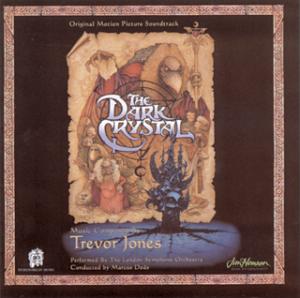
BS: With last year release of the score, fans of your work could at last get an official edition on cd of your work. Why has it been so long before this masterpiece was released?
TJ: Well, I think there’s no many people in the world who thinks that the commercial release of a score is relevant for the market… Those are the kind of things that fall completely out of my hands, if the producer of the film decide not to release a cd with my music that is something I can’t control…
BS: And, have you seen the edition?
TJ: No I haven’t seen it… In fact I didn’t know it had been released until you told me a minute ago…
BS: You didn’t know… Oh My God (laughs).
TJ: Yep, I didn’t (laughs).
BS: Well… Now you do. And since you haven’t seen it I can describe it for you.
TJ: Go on please.
BS: Well, it’s a double CD…
TJ: A double CD?
BS: Yep. It was released through a company called Numeronean Records. The first cd contains the same tracks as the original album edition; the second one contains the complete score as it appears in the movie.
TJ: Oh, really?
BS: I have to tell you that you have surprised me; I did expect you to know about this.
TJ: Well, you know… What the company chooses to do with the material in their hand these days, has little or nothing to do with the composer. That’s their property and they can do whatever they choose to do. All I expect is to get a copy of the edition! (laughs)
BS: I hope you’ll get it one day (laughs).
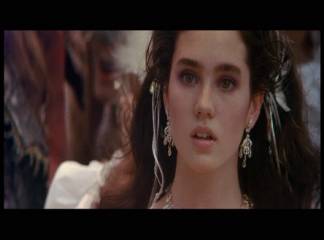
BS: The other movie you made along with Jim Henson, Labyrinth, was very different in its approach to the fantasy world. For a start you have real people, but what I think was decisive for the final aspect of the movie was Bowie’s involvement, am I right?
TJ: Yes.
BS: Getting in the film itself, the first thing that I would ask you would be, was it a creative process as Dark Crystal?
TJ: Labyrinth I can tell you was… I can tell you the story and you can make up your mind…
BS: Okay, go on…
TJ: Jim asked me to go to America with him and Frank Oz, alongside Brian Froud (the designer) and Gary Kurtz, I think he was the producer of the first Star Wars…
BS: Yeah, he produced Star Wars and The
Empire Strikes Back…
TJ: Oh, you’re right… Well,
the five of us went into America to do the promotion of Dark Crystal in
a large number of different cities. In this promotional tour we showed
the film to the press and also had a number of charity screenings
where we raised money for different associations…anyway Jim and
I were sat in an airport… I don’t remember which airport
it was because we visited so many cities in so little time… and Jim asked
me, and I remember this clearly, “what are we going to do next?”,
and I said “what do you mean?”, and he answered “for
a film, what are we going to do next?”…and more or less
I told him that “now that we’ve done this big orchestral
score for Dark Crystal, why don’t we go for a rock idiom,
why don’t we use a totally contemporary approach to fantasy?” He
stared and replied “what do you mean?”, and I told him
we’ll use drums and guitars to give the film a very contemporary
feel and the one thing that would made the film totally different
from Dark Crystal would be the use of real actors… then Jim thought
for a moment and told me “if we use this rock idiom who could
we use to give a real sense to it?”… So we began thinking
on all the big rock stars Mick Jagger, Sting… All
the rock stars who could act…and finally Jim settled
down for David… And that is the story, we didn’t
know what the story would be about, or anything surrounding the film,
the only thing we knew was that we would use rock music and that
David Bowie would be on it.
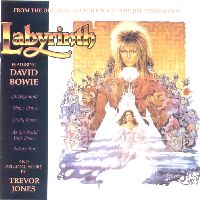
BS: And where did the story come up?
TJ: Later in England Jim and Terry Jones began to work together in the story basing on the few ideas that we talked about in that airport.
BS: Why did it take so long (5 years) to complete the film?
TJ: That shows you how difficult is to put a movie together (laughs).
BS: (laughs) It doesn’t take
so long nowadays. How was David involved in the process of
composing the score?
TJ: Once 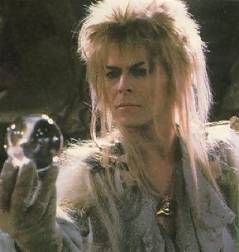 Terry delivered
the script, we decided there were specific scenes that were almost
like set-pieces and David Bowie wanted to use the opportunity
that the movie was giving as a vehicle for his own songs… So
he included four or five of his own songs written specifically for
the movie and my job was that of write an score around the picture
adapting to the style of the songs… Terry delivered
the script, we decided there were specific scenes that were almost
like set-pieces and David Bowie wanted to use the opportunity
that the movie was giving as a vehicle for his own songs… So
he included four or five of his own songs written specifically for
the movie and my job was that of write an score around the picture
adapting to the style of the songs…
BS: And how was the process of working with David Bowie?
TJ: Well, it came about very easily… He’s a phenomenal artist and just been able to contribute to a picture that he was starring was an exciting experience and a wonderful opportunity for me… He was extraordinary professional and always delivered his work in that way; he could get to the studio and in 10 minutes he would have his workdone and be ready to go to dinner… That was him… In fact, one of the most flattering things someone has told me came from him one day in the studio when he told me that he had listened to my score and he was in awe of my talent…(laughs)
BS: That must be shocking coming from him! (laughs)
TJ: Yeah, I was walking in a cloud for months! (laughs)
BS: If you look at the impressive amount of works you’ve done during your career it seems that you don’t want to be typecast in one kind of genre (although you have done quite a few historical movies), why is that?
TJ: Well, the fact is that if a movie I had worked for had been successful I did not want to work in the same genre for a long time. In fact I think there was a good 20 years between Excalibur and Merlin?
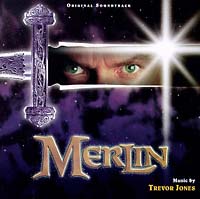
BS: Well, Excalibur was 81's and Merlin 98's… 17 years…
TJ: 17 years between two movies around the same subject … I have always scored movies for myself due to the curious way I look at my work in that… I started at with nothing in the world, all I had was this dream to write music for movies…it’s very simple for me to think what subject would I do next looking at what it’s available and trying not to repeat a genre in a short time period because when I’m working for a film I mine all the possibilities that the genre allows me to and with that I’m not in the mood to get again in the same kind of project unless a lot of time has passed…
BS: So you are always looking for a different vehicle to explore your craft in writing…
TJ: Exactly, and what I fight the most is the Hollywood way of being typecast… I have always been concerned that people thought of me as a composer of film music, not a composer of comedy or sword and sorcery or whatever the genre… Always trying to get the whole spectrum, all the genres…
BS: You can see that looking at your filmography…
TJ: ...This would infuriate a lot of people (laughs) but I just thought that having worked on a particular idea I just had to move to another subject…
BS: 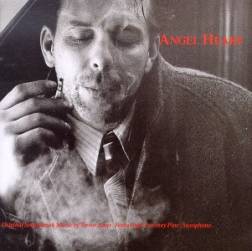 Okay, moving a towards the end of the 80’s we’re now going to comment the two movies you did with Alan Parker, Angel Heart and Mississippi Burning. Both movies got a dense musical approach from your behalf in which I think was an effort not to create a musical atmosphere but an atmosphere itself… Okay, moving a towards the end of the 80’s we’re now going to comment the two movies you did with Alan Parker, Angel Heart and Mississippi Burning. Both movies got a dense musical approach from your behalf in which I think was an effort not to create a musical atmosphere but an atmosphere itself…
TJ: Exactly…
BS: What can you tell us about those two movies?
TJ: Well, if there’s one thing I can say about my life as a composer is that I have been very fortunate to work with some of the greatest directors of the age… I look back on my career and I was so fortunate to be asked by Alan Parker to score Angel Heart… I remember he called from Paris (where he was shooting the movie) and told me to go there and see the movie…when I sat on the screening room all by myself and began to see those images… I was shaking like a puppy when the movie ended (laughs) and when I got out of the room I told Alan that it was a great picture but that I didn’t understand what exactly did he wanted from me. He told me that he expected me to deliver something special to the picture and told me to approach the movie from whenever I choose… So what I did was explore the concept of evil in the picture… Evil is the greatest of human fears and when you want to give a musical sense of evil the only thing you can do is go back, and back and back to the things people find the scariest… The memories you have being a child locked in a dark room or things like that… When you try to connect to those memories is when you find the material to work with… I tried to give that feeling to the score using daily ordinary music that would bridge the world of Johnny to that which he’s getting into, the black magic, his search… It was like a psychological journey for me always trying to relate to the fears and emotions of the audience… But not all the audience but one person in particular, if I can connect to one person then I can reach all the audience… And usually that person is me…
BS: So you’re your potential audience, are you your critic as well?
TJ: Always, if I don’t achieve to scare myself, or make myself laugh or cry then the things I’m writing are worthless…
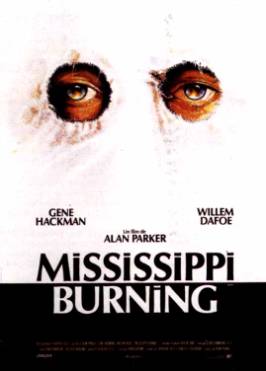
BS: And what do you recollect from Mississippi Burning given the fact that your music underscored almost only the scenes where the Klan or its actions are involved?
TJ: The thing about Mississippi Burning was that the underscore had one very essential rhythmic idea which I came with early on (he hums the main theme of the film) and what I said to Alan was that if we used that idea throughout the film, psychologically would signal to the audience there’s danger near. For me it was a very complicated score (given the historical circumstances it described) but based on a very simple motif… A motif that was constructed from 20 different ways of playing it… You could play only with the percussions or with the whole orchestra and obtain a different reaction form the audience…
BS: Given that you’re from South Africa, did your personal experiences help you in some way in composing the music?
TJ: Well I just felt that I could relate to the film and the story in a very real way because living in South Africa I had experienced the height of the Apartheid. I knew what it was… What it felt like being a black person living in a society who would judge you from the colour of your skin… So I felt a kin understanding of the way the afro American characters were feeling, the fear for their lives and for the lives of their loved ones.
BS: Well, I think that ends our first part of the interview.
TJ: I’m really looking forward for tomorrow’s second part. Until tomorrow then
BS: Yep, until then.
Interview carried by Sergio Benitez
|





